Honorary doctorate for Bristol changemaker and civil rights hero

Guy Bailey OBE, a civil rights activist instrumental in the Bristol Bus Boycott, has been awarded an honorary doctorate by UWE Bristol.
Guy received his Honorary Doctor of Letters on Tuesday 23 July in recognition of his outstanding contributions to race equality, creating communities, and supporting underserved communities.
He’s one of nine individuals to be awarded Honorary Degrees during UWE Bristol’s summer graduation ceremonies, which are being held for the first time at Bristol Beacon, from 15 – 25 July.
On receiving his award, Guy said: "I am truly honoured to receive this Honorary Doctor of Letters Degree and would like to thank all those responsible for making this award possible. I accept it with pride. I will never forget this day and would like to say, remember, self-care is not selfish it’s essential. Thank you."
Described as a ‘legendary changemaker, affordable housing champion and one of Bristol’s finest sons’ by UWE Bristol’s Dr Roger Griffith MBE, Guy moved from Jamaica to Bristol in 1962 to live with his aunt, as his father thought he would receive a better education in England.
In April 1963, aged 17, Guy applied for a job as a bus driver at the Bristol Omnibus Company; he was denied an interview due to the colour of his skin. This resulted in the historic Bristol Bus Boycott which soon attracted national and international attention. A month after the company conceded, it hired Sikh graduate Raghbir Singh as Bristol’s first bus conductor of colour.
Influenced by the Bristol Bus Boycott campaign, Bristol East MP Tony Benn joined Harold Wilson’s cabinet who introduced the 1965 Race Relations Act. Today, this has evolved into the 2010 UK Equalities Act giving rights across gender, LGBTQ+, religion, age and disability groups as well as maternity rights.
In 1965 Guy co-founded The Bristol West Indian Cricket Club (BWICC), for whom he amassed an array of trophies as a batsman. He secured £950,00 from the Lottery Fund and the Sports Council for the Rose Green Centre, the Club’s home, which is widely used today by the community.
In the late 70s, Guy became the first Black education welfare officer in Bristol and one of the first Black governors for inner city schools, a post he held for 25 Years. In 1986 he earned his social work degree at Bristol Polytechnic (now UWE Bristol) and was employed by Bristol City Council as a youth worker.
Back in 1948, when the famed Windrush Generation arrived in Britain from 1948 with hope – they soon faced signs of ‘No Blacks, No Irish, No Dogs’. They were refused loans to buy homes. Overcrowding, poor housing and discrimination were rife in the rented sector. Many ‘pardnered’ together; a saving system used like an informal co-operative bank. A group of people would pay in a sum of money each month, and then take a turn to draw from the collective savings to buy their first home.
Guy bought his home this way, before forming United Housing Association (now Brighter Places) in the 1980s. They began by providing accommodation for Black elders with care staff before becoming a social housing provider for many in the St Pauls and Easton areas.
He took redundancy in 1997 as an education welfare manager. He started a travel agency in Stapleton Road, Easton, but with Guy’s skills it doubled as an advice centre for education, housing, and crime prevention for the local Black community.
“This award is a tribute to a great man and true hero of a civil rights movement in Bristol and the UK,” said Dr Roger Griffith MBE, Associate Lecturer and Diversity and Community Projects at UWE Bristol.
“Guy has inspired me and many others locally and internationally with his sense of purpose and pride in his community. In honouring his achievements of the Bristol Bus Boycott campaigners, he joins a pantheon of great leaders from the Windrush Generation whose efforts have changed the face of Britain.”
Related news

24 November 2025
UWE Bristol celebrates achievements of thousands of students at Graduation ceremonies
The academic achievements of nearly 3,000 students will be celebrated this week (24-28 November 2025) as UWE Bristol’s autumn Graduation ceremonies take place at the Bristol Beacon.

30 July 2025
Bristol Pride director awarded honorary degree
Daryn Carter MBE, director of Bristol Pride, has been awarded an honorary degree by UWE Bristol in recognition of his service to the LGBTQ+ community in Bristol.

28 July 2025
Student wins bronze medal at World Aquatics Championships on her graduation day
UWE Bristol sports rehabilitation student Izzy Thorpe made waves at the World Aquatics Championships winning a bronze medal in artistic swimming on the same day she was meant to be crossing the stage at her university graduation ceremony.

22 July 2025
Angellica Bell receives honorary doctorate from UWE Bristol
Angellica Bell, a prominent figure on British television and radio, has been awarded an honorary degree by UWE Bristol.

21 July 2025
Fortnight of celebrations begin at UWE Bristol's Graduation ceremonies
The university will celebrate nearly 6,000 graduates at ceremonies running over the next two weeks (21-31 July) at the Bristol Beacon.
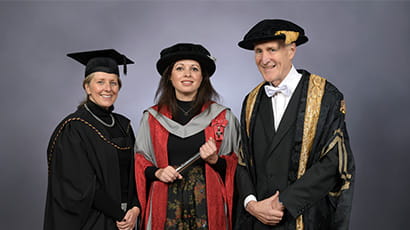
28 November 2024
Entrepreneur and advocate for workplace equality awarded honorary degree by UWE Bristol
Dr Zara Nanu MBE, an innovator in addressing workplace inequalities and tackling the gender pay gap, has been awarded an honorary degree by UWE Bristol.
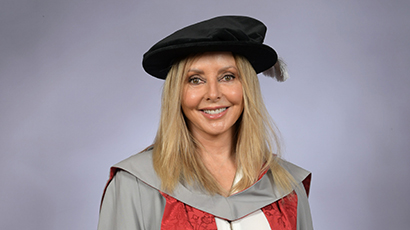
27 November 2024
Carol Vorderman receives honorary doctorate from UWE Bristol
Broadcaster and writer Carol Vorderman MBE has been awarded an honorary degree by UWE Bristol.
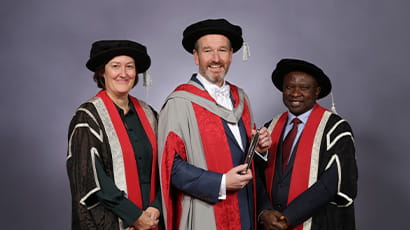
26 November 2024
Bristol learning foundation chief executive awarded honorary doctorate
Steve Taylor, Chief Executive of the Cabot Learning Federation (CLF), has been awarded an honorary doctorate by UWE Bristol.
25 November 2024
Celebrations begin for UWE Bristol’s autumn Graduation ceremonies
Nearly 3,400 students will celebrate their academic achievements at UWE Bristol’s autumn Graduation ceremonies taking place this week (25-28 November) at the Bristol Beacon.
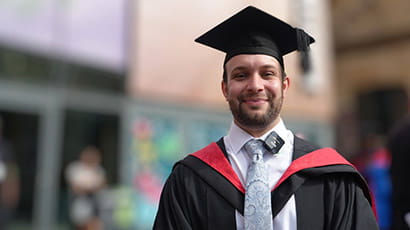
29 July 2024
Student who dedicated his time at university to helping disabled people graduates
A student who has dedicated his time at UWE Bristol to helping people with disabilities has graduated.
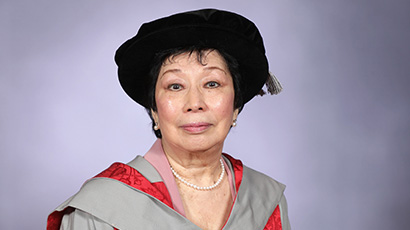
25 July 2024
Extraordinary community work recognised with honorary doctorate
Rosa Hui MBE DL, founder of the Chinese Community Wellbeing Society (CCWS), has been awarded an honorary doctorate by UWE Bristol.
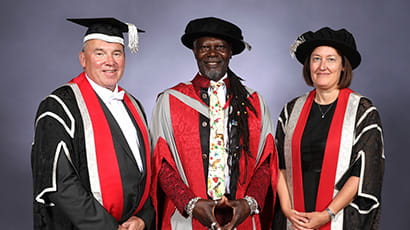
23 July 2024
Entrepreneur Levi Roots shares love for ‘great city of Bristol’ as he collects UWE Bristol Honorary Degree
Entrepreneur Levi Roots has been awarded an Honorary Doctor of Letters by UWE Bristol recognising his commitment to future generations and the city of Bristol.
You may also be interested in

Media enquiries
Enquiries related to news releases and press and contacts for the media team.
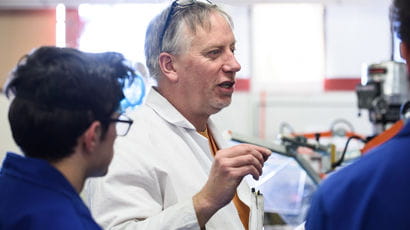
Find an expert
Media contacts are invited to check out the vast range of subjects where UWE Bristol can offer up expert commentary.






